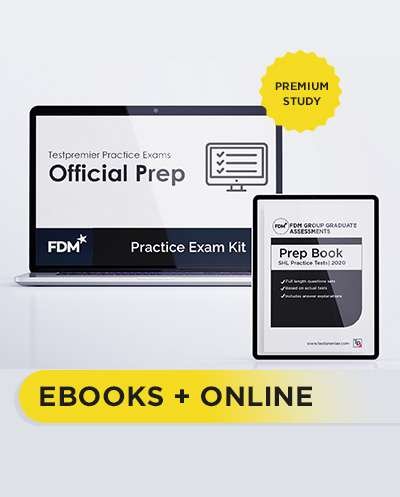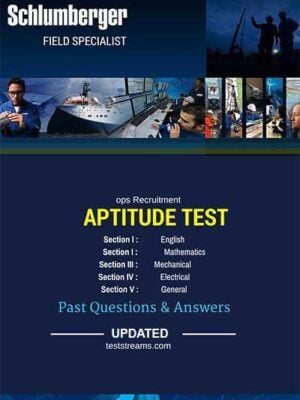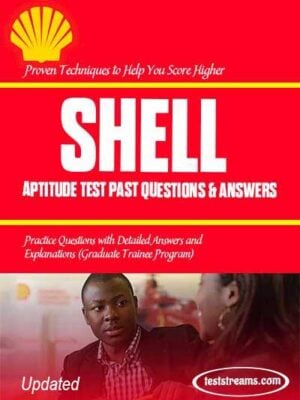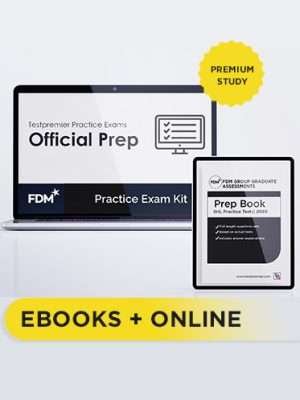Description
FDM Group Practice Aptitude Test Pack
Boost your preparation for FDM Group’s graduate assessment with the comprehensive FDM Group Practice Aptitude Test Pack. This pack features updated and in-depth practice materials that mirror the real test format, helping you familiarize yourself with the types of questions you’ll encounter. Here’s what the pack offers:
What’s Inside the FDM Group Practice Pack
- FDM Group Numerical Reasoning Test / SHL Style
- FDM Group Verbal Reasoning Test / SHL Style
- FDM Group Diagrammatic & Logical Reasoning Tests / SHL Style
Each section includes step-by-step explanations for every question and provides strategies to answer them more efficiently
About FDM Group
FDM Group is a global leader in IT and business consulting, established in 1991. They specialize in delivering business transformation solutions and digital services, helping organizations around the world adapt to technological advancements. FDM is also known for offering career opportunities to graduates and professionals through their renowned training and placement programs, making it a key entry point for individuals seeking to start or advance in tech and business sectors.
FDM Group Aptitude Test Formats: What to Expect
FDM Group’s recruitment assessments are designed to evaluate skills and traits that align with their core roles. Here’s what you can typically expect:
1. Technical Knowledge Assessment
– Covers core technical skills relevant to the job.
– May include questions on programming, database management, IT systems, software development methodologies, and technical problem-solving.
2. Problem-Solving Exercises
– Scenario-based problems to test analytical thinking and real-world problem-solving.
– Exercises may involve data analysis, technical scenarios, or business cases that need practical solutions.
3. Aptitude Tests
– Numerical Reasoning: Focuses on interpreting data, analyzing trends, and solving numerical problems.
– Verbal Reasoning: Tests comprehension skills and ability to extract logical conclusions from written information.
– Logical/Diagrammatic Reasoning: Evaluates pattern recognition, sequences, and analytical reasoning.
4. Situational Judgment Tests (SJTs)
– Tests decision-making in various hypothetical work situations.
– Scenarios assess judgment, professional behavior, and client interaction skills.
5. Behavioral and Personality Assessments
– Analyzes communication, teamwork, leadership potential, and adaptability.
– Determines how well you fit with FDM’s collaborative culture and values.
6. Exam Format and Duration
– Varies by role; includes multiple-choice questions, coding challenges, case studies, and essay-style tasks.
– Emphasis on time management and practical application of knowledge.
FREE SAMPLE FDM PAST QUESTIONS AND ANSWERS

Question-1:
How much was spent on Clothes and Shoes in year 5 if the same percent increase was
maintained as between year 3 and year 4?
A. 1,920 Euros
B. 1,921 Euros
C. 1,922 Euros
D. 1,934 Euros
E. 1,935 Euro
VERBAL REASONING
Passage 1 – Credit Card Fraud
Question 1.
Top of the table of types of fraud are those committed with credit cards stolen from people’s post.
A. True
B. False
C. Cannot tell
Answer: C. Cannot tell
Explanation: The passage does not confirm if this type is the top form of fraud.
Question 2.
The new measures are sophisticated anti-fraud strategies.
A. True
B. False
C. Cannot tell
Answer: A. True
Explanation: The passage states the measures are indeed anti-fraud strategies.
Question 3.
The new measures are already in place.
A. True
B. False
C. Cannot tell
Answer: B. False
Explanation: There is no evidence they are already operational.
Question 4.
Credit card fraud committed as a result of cards intercepted through the post has reached £500 million.
A. True
B. False
C. Cannot tell
Answer: C. Cannot tell
Explanation: The exact figure is not given in the passage.
Question 5.
The level of losses to overall credit card fraud rose by 20 per cent.
A. True
B. False
C. Cannot tell
Answer: A. True
Explanation: The passage confirms a 20% rise.
Passage 2 – Road Humps
Question 6.
Delays to the ambulance service and environmental concerns are raised as objections to road humps.
A. True
B. False
C. Cannot tell
Answer: A. True
Explanation: Critics highlight ambulance delays, pollution, and congestion as objections.
Question 7.
It is fair to say that road humps can save lives and injuries but at a price.
A. True
B. False
C. Cannot tell
Answer: A. True
Explanation: Road humps reduce accidents but cause delays, noise, and pollution.
Question 8.
Drivers find road humps annoying.
A. True
B. False
C. Cannot tell
Answer: A. True
Explanation: Residents complain of noise, and drivers are implied to be frustrated.
Question 9.
Critics believe that traffic would flow more smoothly if road humps were removed.
A. True
B. False
C. Cannot tell
Answer: A. True
Explanation: Critics claim humps disrupt the flow of traffic.
This pack provides an excellent way to navigate FDM’s selection process and improve your confidence with real-world practice questions, tailored explanations, and tips to excel.











Reviews
There are no reviews yet.